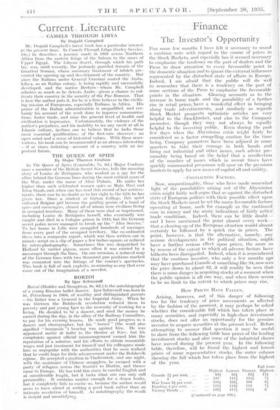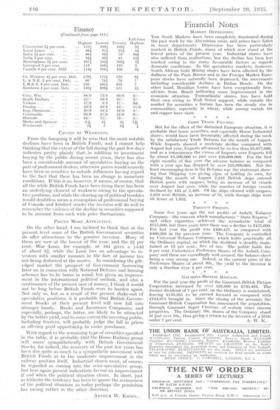Finance
The Investor's Opportunity
Fort some few months I have felt it necessary to sound a 'cautious note with regard to the course of prices in the Stock Markets, and especially has it seemed necessary to emphasise the tendency .on the part of dealers and the Press ' to draw attention to every favourable point in the domestic situation and to ignore-the external influences represented by the disturbed state of affairs in Europe. Indeed, I am afraid that the public will do well to remember that there is a tendency on the part of some sections of the Press to oriphasise the favourable points • in the situation. Glowing 'accounts as to the increase in home trade and the possibility of a further rise in retail . priees,lrve a wonderful effect in bringing along trade, advertisements, and similarly as regards Stock Market prospects optimistic articles are very helpful to the \ Stockbroker, and also to the Company promoter, though they 'may not always be equally helpful to the investing public. Even during the past few days when the Abyssinian crisis might fairly be considered as a factor compelling caution for the time being, Company promoters have been adjiired in some quarters to take their courage in . both, hands and bring out industrial and other issues, such advice pre- sumably being based on the belief that a recollection of the number of issues which in recent times have quickly commanded premiums will spur on the premium hunters to apply for new issues of capital all and sundry.
'CONFLICTING FACTORS.
Now, unquestionably, those who have made somewhat light of the possibilities arising out of the Abyssinian crisis might fairly well argue that as against the disturbed state of European polities; with their possible effect upon the Stock Markets rnust 'be set the many favourable factors: operating at -• home, such for example as 'the. continued ease in money and the ninny hidicatibns of fairly tretiVe, trade condition's. -Indeed, there can be little doubt— and I have mentioned the point almost every week— that a clearing up of the European situation would almost certainly be followed -by a quick rise --in prices. The point, however, is that the alternative, namely, any serious developments in the political situation, might; have a further serious effect upon prices, the more so by reason of the extent to which all adverse factors have hitherto been disregarded. Indeed, when it is remembered that the cautious investor, who only a few months a& may have purchased Consols at something like 94, now sees. the price down to. about 82, it will readily be seen that there is some danger in acquiring stocks at a moment when the public opinion is all one way, and when there seems to be no limit to the extent to which prices may rise.
How PRICES HAVE FALLEN.
Arising, however, out of this danger of following too far the tendency of price movements as affected by the fashion of the moment, it may perhaps be asked whether the considerable fall which has taken place in many securities, and especially in high-class investment stocks, does not offer an opportunity for the genuine investor to acquire securities at the present level. Before attempting to answer that question it may be useful , to show from 'the following table how prices of the leading investment stocks and also some of the industrial shares have moved during the' present year: ' In 'the following' table, therefore, will- be found the highest and lowest prices of some representative stocks, the outer column showing the fall which has taken place from the highest ' of the yea.
Fall
Highest Lowest, Present. Highest.
Consols Consols 2/ per cont.
Pf 4 fl War Loan 3i per cent. Funding 4 per cent. Victory Bonds
..
• •
..
. . .. 119
.. '
110}
.. 121f 1l9 1 104 82} 111} 103 i 113* 112 * 8 821 1111 114 1111 111 61
(Continued on page 440.)
Finance
(Continued from page 444.) Fall from Highest. Lowest. Present. Highest.
91 5+ 161 141 31 3 61 Of 7 7 51 8/- 3f- 9d. 11/3 4/- 6/- 5f- 1# CAUSES OF WEAKNESS.
From the foregoing it will be seen that the most notable declines have been in British Funds, and I cannot help thinking that the extent of the fall during the past few days indicates pretty plainly that, in addition. to investment buying by the public during recent yearS, there has also been a considerable amount of speculative buying on the part of professional dealers, otherwise prices would scarcely have been so sensitive to outside influences having regard to the fact that there has been no change in monetary conditions. If this is so, however, it means, of course, that all the while British Funds have been rising there has been an underlying element of weakness owing to the specula- tive positions, and while the clearing up of political troubles would doubtless mean a resumption of professional buying of Consols and kindred stocks the investor will do well to remember the violence of the decline in securities supposed to be immune from such wide price fluctuations.
PRICES MORE ATTRACTIVE.
On the other hand, I am inclined to think that at the present level some of the British Government securities do offer attractions to the genuine investor. Many of them are now at the lowest • of the year, and the 81 per eent. • War ^Loan, for example, at . 104 gives a yield of about 81 while the Loan has an advantage to in- vestors with smaller incomes in the fact of income tax not being deducted at the source. In considering the gilt- edged market the prospect of .Government borrowing later on in, connexion with National Defence 'and. housing scheines, has to...be borne in mind, but given an improve- ment in the international political outlook, and also a continuance of the present ease of money, I think it would not be long before British Funds were to harden again. Not only so, but as a result of the present shake-out of speculative positions, it is probable that British' Govern- ment Stocks at their present level will now fall into stronger hands. Banks and Insurance Companies, and especially, perhaps, the latter; are likely to be attracted by the better yield, and to some extent the investing public, including trustees, will probably judge the fall in prices as offering good opportunitg to make purchases.
• With regard to the remaining type of securities specified in the table, it is probable that the Home Railway group will move' sympathetically with British. Goveinment Stocks, for indeed, the recovery of the past few years has been due quite as rime)), to a sympathetic movement with British Funds as to the moderate improvement in the' railway position itself. Industrial shares must, of course, be regarded as coming into the semi-speculative group, but here again present indications favour an improvement if and when the political situation clears. In short, just as hitherto the tendency has been to ignore the seriousness of the political situation, so today perhaps the pendulum has swung rather in the other direction. '
Conversion 31 per cent. • • 112+ 103/ 103f Local Loans . .. 981 921 921 India 21 per cent. .. • • 86f 69f 70 India 3 per cent. • • 951 80+ 81 Birmingham 3} per cent. • . 1071 1031 1031 Liverpool 5 per cent. .. • • 113 1091 110 Canada 4 per cent. 1953 • • 1141 1081 108 Gt. Western 41 per cent. Deb. 1291 1221 123 L. & N.E. 3 per cent. Deb. .. 86 76f 79 L.M.& S. 4 per cent. Deb. .. 110 102+ 103 Southern 4 per cent. Deb. .. 1161 109+ 111 Cory, Wm. ..
•
88/6 73/6 • 80/6 South Durham
• •
55/-
33/3 52/- 'Vickers
• •
17/9 8/9
17j-
Dunlop ..
• •
53/3 40/9 42/- Imp. Chemicals. .
• •
38/9 34/3 34/9 Courtaulds
60/9 47/6 54/9 Harrods
84f-
72/- .
79/-
Marks and Spencer
6 4+ 41 Woolworth ..
51 5 • 51
ARTHUR W. KIDDY.







































 Previous page
Previous page